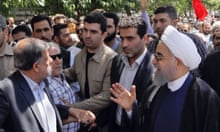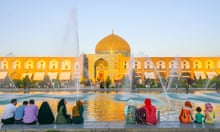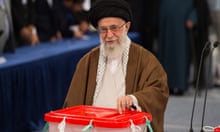Tensions are mounting between Iran’s supreme leader and the country’s president after the latter’s landslide victory in last month’s election.
Ayatollah Ali Khamenei, 78, has sharpened his criticism of the reformist president, Hassan Rouhani, including humiliating him in a meeting of the country’s most senior officials.
A hardliner keen to preserve his legacy, Khamenei is believed to have tacitly backed Ebrahim Raisi, Rouhani’s rival, in the election.
The president, who increased his mandate by 5m votes when he won his second term, fired back this week by saying that the political legitimacy of a religious leader is determined by the “people’s will and invitation” – comments that supporters of Khamenei, whose position as supreme leader is a lifelong appointment, have received with disdain.Clerics sympathetic to Khamenei argue that the legitimacy of the leader, or the rule of the Islamic jurist (Velayat-e-Faghih) is divine.
Rouhani’s comments come after Khamenei delivered a withering speech last week to an audience of senior officials including Rouhani, the judiciary chief and the parliamentary speaker.
“Mr President has talked at great lengths about the country’s economy and well, he’s said ‘this should be done’, ‘that should be done’,” Khamenei said. “But who is he addressing by mentioning the ‘should dos’?” the ayatollah asked, before responding: “Himself.”
A video circulating online of that moment shows the audience bursting into laughter while Rouhani smiles uncomfortably.
Khamenei continued: “In 1980-1981 the then president polarised society in two camps, and divided the country into opponents and supporters; this should not be repeated.”
The ayatollah was referring to the first post-revolutionary president, Abolhassan Banisadr, who was impeached and later exiled after clashing with the clerical establishment. Rouhani’s supporters view the leader’s comments as a warning that he may face a similar fate.
Ali Ansari, director of the Institute of Iranian Studies at St Andrews University, said Khamenei was attempting to curb Rouhani’s rising popularity after his election success.
“After the elections Khamenei was unhappy with the results and they’re trying to contain it,” Ansari said. “It’s all standard stuff that we heard in 2000, 2001 when they got a bit panicky and worried about what [former reformist president Mohammad] Khatami would try and do. They want to send a message to Rouhani to get back into your box.”
He added: “He’s interestingly saying, I’m not.”
The power struggle has also seen Rouhani forced to defend his success at the ballot box. Addressing a group of university professors, he referred to Ali ibn Abi Talib, the prophet Muhammad’s son-in-law, a revered Shia figure also respected by Sunnis, who became a caliph only when people showed him support.
“We are not following western beliefs when we’re holding elections and going after people’s votes,” he said, insisting that democracy was not a western gift. “We belong to a religion in which [Imam Ali] based his leadership on people’s will and people’s vote.”
Khamenei, in particular, bought into the anti-Rouhani spin during the campaign period that said his administration was promoting western lifestyle choices and homosexuality in schools – false claims that infuriated Rouhani.
Rouhani’s predecessors have also found that their relations with Khamenei became more strained in their second term in office, as they jostled to leave their own legacy and test the limits of power under the Iranian constitution and Khamenei’s supreme authority. Even hardliner Mahmoud Ahmadinejad, who was blocked from running in this year’s election, fell foul of Khamenei during his second term in office.
Referring to the previous administrations of Mohammad Khatami and his predecessor, Hashemi Rafsanjani, Ansari said: “Both of them were probably more diplomatic than Rouhani was, but they basically said the same thing.”
However, the power struggle between the elected faction and the unelected faction of the Iranian establishment has become even more complicated under Rouhani tenure because of uncertainty over Khamenei’s succession. There is also uncertainty surrounding Khamenei’s state of health after his prostate surgery in 2014.
“What’s interesting is that Khamenei has been so blunt in his criticism, he’s been very personal – that meeting where he actually specifically named Rouhani and said get on with your job and stop criticising other people, and everyone laughed about it,” said Ansari. “Basically, Khamenei has given the green light to hardliners to start containing him, but we have to wait and see how it pans out. Obviously they’re trying to hit him [Rouhani] very hard, and we just have to see how Rouhani responds.”







